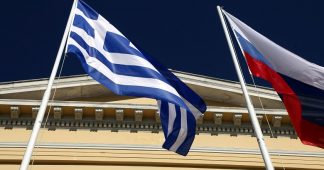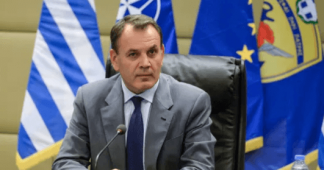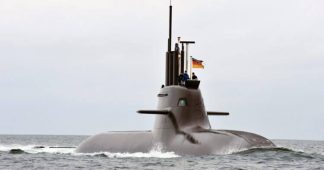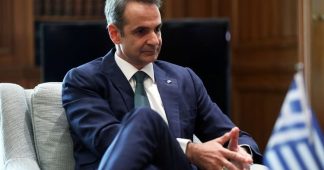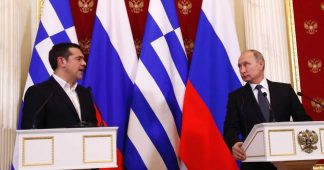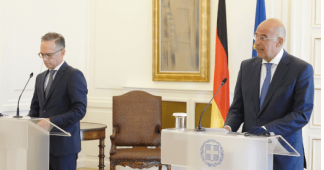By William Mallinson
Nov.,23, 2021
Early last year, I concluded an article entitled ‘Greece and Russia: back to the ‘Truman Doctrine?’, with the words: ‘Then becomes now, albeit with different colors. Just as with Britain during her heyday, Greece’s relations with Russia today are predicated on the US’s keeping Russia at bay in the Eastern Mediterranean, and therefore from having positive and close relations with Greece, Russia’s natural ally in the Nineteenth Century. It would take a Greek statesman of the calibre of Kapodistrias, de Gaulle or Putin to even begin to re-establish the balance. Common religious and historical ties are not enough.’
In line with the above and given recent developments, it now looks as though Greece is going all-out to be NATO’s anti-Russian Eastern Mediterranean cheerleader. The Truman Doctrine and the Greek junta’s pro-American foreign policy (1967 to 1974), have now returned with a vengeance. Behind this policy lie both Greece’s atavistic fear of a Turkish aggression and her ruling families’ post-1945 automatic tendency to turn to America for protection, in line with the Truman doctrine of ‘keeping the Communists away’. Today, however, the Communists seem to have transmogrified into Putin’s non-communist Russia, with neo-Trumanism the order of the day.
Greece has of course every right to worry about Turkey, given the expulsion from Turkey of almost all those of Greek stock in 1964; at least three near wars; Turkey’s invasion of Cyprus in 1974; the continuing occupation of over one third of the island; the Imia crisis; Turkey’s declaration that Greece’s activation of the extension of her maritime borders to twelve nautical miles would constitute a casus belli; recent naval aggression over oil-drilling rights around Cyprus; and threats over Western Thrace.
But those who forget history, or studiously ignore it, can come a cropper, especially those such as the current Greek Defence Minister, Nikos Panagiotopoulos, who seems to have forgotten his history and is repeating the mistakes of the junta in his keenness to please Uncle Sam: on 11 November, he attended the 15th Annual Baltic Defense Conference on the new Strategic Concept of NATO. Herewith some extracts of what he said: ‘Russia, as a permanent member of the UN Security Council and one of the major nuclear powers, will remain an important player with the potential to cause serious complications. […] we must use our resources efficiently to give a credible, well-balanced, proportionate and sustainable response to Russia’s aggression, so we must continue to strengthen our deterrent and defensive stance by fully implementing all relevant doctrines.’ To cap it all, he referred to Russia’s ‘expansive military action’ and the need to improve the effectiveness of NATO’s Integrated Air Defense and Missile Defense System, which will contribute decisively to the new Center for Excellence in Integrated Air Defense and Missile Defense, in Crete. He could have been mistaken for the Russophobic Boris Johnson or a jingoistic Polish general.
Do Mr. Panagiotopoulos and his advisers properly understand US policy, or is there a danger, as with the junta, that they will continue to be cajoled into believing that the US would prevent Turkey from grabbing a Greek island or flexing more military muscle in Cyprus, just because Greece is becoming a major US anti-Russian base? Just as the Greek junta was cajoled by Kissinger and the CIA in 1974 into believing that Turkey would not invade Cyprus, so various US officials, both clandestine and open, may well be persuading the NATO-friendly part of the Greek establishment that Turkey does not mean what she says about Greece.
This quote by a British diplomat in 1975, following the Turkish occupation of over two thirds of Cyprus in 1974 is still valid today, and is very telling indeed: ‘The Turks seem to have concluded early on that American pressure would not be backed by anything stronger [e.g. military action]; this was no doubt a factor in their tactics at the second Geneva conference. It is certainly the case that Dr. Kissinger was concerned with the maintenance of Turkish goodwill as a bulwark between the Soviet Union and the Arab States as well as the continued use of the US bases in Turkey.’1
It has always been the case that the US would not permit a full-scale war between NATO ‘allies’ Greece and Turkey, for fear of weakening NATO. Thus, when the US permitted Turkey to invade and occupy over one third of Cyprus, this was on the strict understanding that Greece would not be allowed to defend Cyprus, as turned out to be the case. Were Turkey to take a small Greek island, the US would not allow Greece to attack Turkish forces to take it back.
Even the Greek Foreign Affairs Council (which is meant to advise the Foreign Ministry) produces naïve and selectively documented papers to produce the impression that Greece can trust the US to defend it, and that the West is Greece’s saviour. For example, one allegedly academic paper states: ‘When assessing the alignment of Greece with the West during the Cold War, one can see that the relationship is deeply rooted. Modern Greece owes its creation, to a great extent, to the Western Europeans who aided the Greek Revolution back in 1821.’2
The authors of the paper appear to be blissfully unaware of the fact that Greece would not have achieved independence without Russia. Britain was forced into the equation to keep its finger in the pie, after Russia exercised its rights under the Anglo-Russian Protocol of April 4, 1826, which stated that Britain would mediate to make Greece an autonomous vassal of the Ottoman Empire, but that if this proved impossible, the two powers could intervene jointly or separately. Russia intervened, and Britain was forced to adopt an “if you can’t beat’em, join ‘em” approach.
The paper also deals extensively with Cyprus, not deigning to even mention the British role in dividing the two communities, in helping Turkey with its propaganda and in bringing in Turkey surreptitiously and illegally via a conference, that was intended to fail, as it did, in 1955. Similarly, the paper tries to exonerate the US: ‘Thus, the Cyprus invasion was tackled by low-ranking State Department officials who could not risk taking important decisions in order to deescalate the crisis. In effect, it can be valuably argued that the Watergate scandal, along with the Arab-Israeli war (1973) and the last phases of the Vietnam War (1955-1975) diverted Washington’s attention from Cyprus.’
Had the authors not been so selective in their bibliography, they would surely be aware that Henry Kissinger was very much on the ball, and expressly delayed events to afford Turkey the space it needed to occupy over two thirds of the island.3
Why is the Greek government being so naïve? Is it simply that it seriously believes that America will protect it from – carefully planned – Turkish excesses? Does it believe that Russia will simply sit on its haunches while America uses Greece as a military tool for its anti-Russian policies? Whatever happens – in a currently particularly volatile Eastern Mediterranean – Russia will certainly not lift a finger should Turkey take a Greek island, sink a Greek ship or shoot down a jet-fighter. As regards Cyprus, Russia’s policy is simply to ensure that Cyprus does not become a member of NATO.
Greece ignores history at her peril.
[1] See FCO Secret and Eclipse paper ‘British Policy on Cyprus: July to September 1974’, 14 January 1976, BNA- FCO 9/2379, file WSC 020/548/1. ‘Eclipse’ means ‘don’t show to the Americans’.
[2] Gilbert, Professor Mark and Marcantonatos, Leonidas, ‘The Significance of Aligning Greece with the West during the Cold War’, Johns Hopkins – School of Advanced International Studies, Greek Foreign Affairs Council, 2015.
[3] See Mallinson, William, Kissinger and the Invasion of Cyprus: Diplomacy in the Eastern Mediterranean, Cambridge Scholars Publishing, Newcastle upon Tyne, 2016 and 2017.
Published at russiancouncil.ru
We remind our readers that publication of articles on our site does not mean that we agree with what is written. Our policy is to publish anything which we consider of interest, so as to assist our readers in forming their opinions. Sometimes we even publish articles with which we totally disagree, since we believe it is important for our readers to be informed on as wide a spectrum of views as possible.
